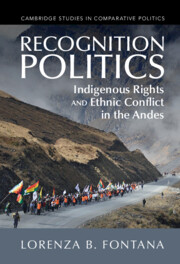Book contents
- Recognition Politics
- Cambridge Studies in Comparative Politics
- Recognition Politics
- Copyright page
- Dedication
- Contents
- Figures
- Tables
- Acknowledgements
- Acronyms and Abbreviations
- Introduction
- 1 Recognition Conflicts
- 2 Citizenship and Development in the Andes
- 3 Class and Ethnic Shifts
- 4 Recognition for Whom?
- 5 The Physical Boundaries of Identity
- 6 Unsettled Demographies
- 7 Struggles for Inclusion and Exclusion
- 8 Rethinking Recognition: What Are the Implications for Identity Governance?
- References
- Index
- Other Books in the Series (continued from page ii)
7 - Struggles for Inclusion and Exclusion
Published online by Cambridge University Press: 05 January 2023
- Recognition Politics
- Cambridge Studies in Comparative Politics
- Recognition Politics
- Copyright page
- Dedication
- Contents
- Figures
- Tables
- Acknowledgements
- Acronyms and Abbreviations
- Introduction
- 1 Recognition Conflicts
- 2 Citizenship and Development in the Andes
- 3 Class and Ethnic Shifts
- 4 Recognition for Whom?
- 5 The Physical Boundaries of Identity
- 6 Unsettled Demographies
- 7 Struggles for Inclusion and Exclusion
- 8 Rethinking Recognition: What Are the Implications for Identity Governance?
- References
- Index
- Other Books in the Series (continued from page ii)
Summary
Since the 1970s, the rise of identity politics has had a crucial impact on debates about the relationship between education and diversity. A new focus was placed on cultural and linguistic differences, as both sources of discrimination in the school environment and indispensable components of multicultural curricula (Vavrus 2015). In normative terms, this perspective contributed to popularising two major policy initiatives: intercultural (bilingual) education (IBE) and race-focused affirmative action (AA) measures. I term these initiatives, which, in different ways, have sought to account for ethno-cultural diversity in education, the ‘identity policies in education’. More than three decades after these initiatives were launched, IBE and AA remain popular policies for ethno-cultural management in education across the world. I include these policies under the ‘means of recognition’ category, as their main effect rests on the crystallisation of ethnic categories in education norms and implementation, while their impact on redistribution is indirect and less substantial compared to other explicitly distributive recognition policies (e.g. agrarian reforms).
Keywords
- Type
- Chapter
- Information
- Recognition PoliticsIndigenous Rights and Ethnic Conflict in the Andes, pp. 175 - 191Publisher: Cambridge University PressPrint publication year: 2023

